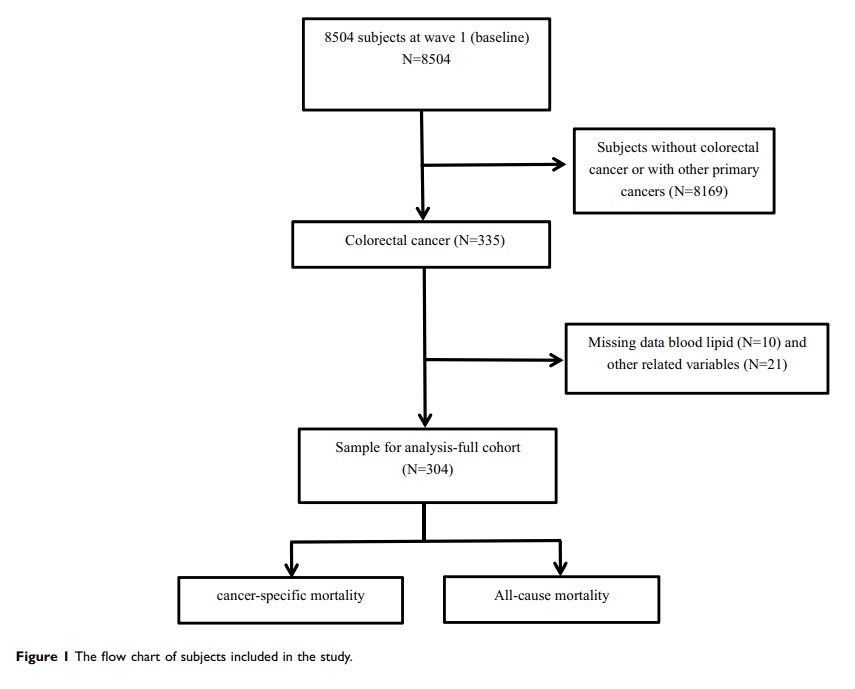9 1 2 3 6
论文已发表
注册即可获取德孚的最新动态
IF 收录期刊
- 2.6 Breast Cancer (Dove Med Press)
- 3.9 Clin Epidemiol
- 3.3 Cancer Manag Res
- 3.9 Infect Drug Resist
- 3.6 Clin Interv Aging
- 4.8 Drug Des Dev Ther
- 2.8 Int J Chronic Obstr
- 8.0 Int J Nanomed
- 2.3 Int J Women's Health
- 3.2 Neuropsych Dis Treat
- 4.0 OncoTargets Ther
- 2.2 Patient Prefer Adher
- 2.8 Ther Clin Risk Manag
- 2.7 J Pain Res
- 3.3 Diabet Metab Synd Ob
- 4.3 Psychol Res Behav Ma
- 3.4 Nat Sci Sleep
- 1.9 Pharmgenomics Pers Med
- 3.5 Risk Manag Healthc Policy
- 4.5 J Inflamm Res
- 2.3 Int J Gen Med
- 4.1 J Hepatocell Carcinoma
- 3.2 J Asthma Allergy
- 2.3 Clin Cosmet Investig Dermatol
- 3.3 J Multidiscip Healthc

大肠癌(≥65 岁)患者的血脂水平升高与癌症特异性死亡率和全因死亡率相关:一项基于人群的前瞻性队列研究
Authors Yang Y, Gao G, Shi J, Zhang J
Received 27 April 2020
Accepted for publication 8 July 2020
Published 23 July 2020 Volume 2020:13 Pages 855—863
DOI https://doi.org/10.2147/RMHP.S260113
Checked for plagiarism Yes
Review by Single-blind
Peer reviewer comments 2
Editor who approved publication: Professor Marco Carotenuto
Background: Hyperlipidaemia is related to the development of many cancers. The aim of this study was to explore whether blood lipid levels were associated with increased rates of cancer-specific mortality and all-cause mortality in patients with colorectal cancer (CRC).
Methods: Data on 8504 participants from The Irish Longitudinal Study on Ageing (TILDA) were analysed. A total of 304 participants with CRC who had experienced curative surgery were included. Logistic regression analysis was performed to analyse the relationship between blood lipid levels and CRC severity. Cox regression analysis was performed to assess the association between blood lipid levels and cancer-specific mortality and all-cause mortality in patients with CRC.
Results: In 304 patients with CRC, the average age was 67.8± 5.4 years. The logistic regression analysis indicated that elevated levels of total cholesterol (2.104 [1.358– 3.650]; P -trend< 0.001), triglycerides (1.665 [1.337– 2.076]; P -trend=0.005) and LDL (2.127 [1.446– 4.099]; P -trend< 0.001) but not HDL (0.688 [0.409– 1.252]; P -trend=0.124) were associated with an increased risk of higher CRC stage after adjustments were made for age, sex, marital status, BMI, drinking status, smoking status, education, physical activity, antilipidaemic medications and self-reported CVDs (≥ 2). Cox proportional hazard analysis showed that higher blood lipid levels of total cholesterol, triglycerides and LDL were independently associated with higher rates of cancer-specific mortality and all-cause mortality. Similar results persisted in the sensitivity analysis using antilipidaemic medications as an additional covariate and the stratification analysis using antilipidaemic medications as a stratified variable.
Conclusion: Increased blood lipid levels were associated with an increased risk of cancer-specific mortality and all-cause mortality in patients with CRC after adjusting for potential confounding factors. Clinicians should pay more attention to the prognostic value of increased blood lipids in patients with CRC for the risk of death.
Keywords: blood lipids, colorectal cancer, cancer-specific mortality, all-cause mortality, prognostic value
